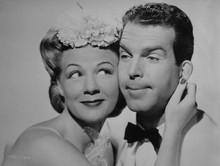 Loading... Please wait...
Loading... Please wait...New Products
Our Newsletter
Product Description
And The Angels Sing (1944)
Director:
George Marshall
Writers:
Claude Binyon (based on a story by), Melvin Frank (screenplay)Stars:
Dorothy Lamour, Fred MacMurray, Betty Hutton
And The Angels Sing is an odd smorgasbord of musical-comedy and romance -- part screwball comedy, part backstage musical, part pop music showcase, and all of it actually a mash-up/remake of two earlier Paramount titles, Every Night At Eight (1935) and Sing You Sinners (1937) (which had also co-starred Fred MacMurray). Dorothy Lamour, Betty Hutton, Diana Lynn, and Mimi Chandler play, respectively, Nancy Angel, Bobby Angel, Josie Angel, and Patti Angel, the four daughters of widowered inventor/farmer "Pop" Angel (Raymond Walburn). All four daughters have ambitions as artists, writers etc. But they're only good at the one thing they've actually been trained to do, i.e. singing -- which they hate doing, especially together. The four desire independence from each other, but lack the means to achieve it, all of which wears on their loving but long-suffering father, who only wants to get enough money together to buy a small soybean farm. When Bobby ropes them into singing for a band led by Happy Marshall Fred MacMurray, the fur really begins to fly -- Happy puts the romantic moves on Nancy before he realizes she's part of the singing act he's booked; but it's Bobby whole managed to fall in love with him. And matters get even more complicated when the Angel sisters, presenting an act worthy of the Andrews Sisters, go over well with the audience. And that's before Happy is forced by circumstances to cheat the girls not only out of the $40 they earned, but the $190 that Bobby won. Misunderstanding and mistakes pile up on top of each other as the Angel sisters follow Happy to Brooklyn, get him tossed out of the club he's booked in, lose him his band, and reduce him and his partner Fuzzy Johnson (Eddie Foy, Jr.) to doing an embarrassing singing waiter act (for coins tossed to them), all in a quest to return the girls' money. In the process, the Angel sisters display loyalty and devotion to each other, and a strength in numbers and unity that's only undone by their own father. The music is entertaining, though the title song is only heard as an instrumental performed by Happy's band -- Betty Hutton's scatting is one highlight, and the Angel sisters' act is fun as well. Some of the better comic bits, apart from Raymond Walburn's blustery expressions of temper, include the backstage antics of Happy and his band; a great extended bit based on Brooklyn dialect featuring Dorothy Lamour and Frank Faylen (as Herman...er...Hoiman); and the slapstick bits involving the girls fending off various men.
Currency Converter
Choose a currency below to display product prices in the selected currency.


















